Commercial Water Restoration In Cape Coral FL | And More
Commercial Restoration can be a pretty straightforward task and doesn’t have to take a lot of time. However, the most important thing is to understand what you are doing and the magnitude of the project.
- Rapid Response Mobilization
- Fire Damage Restoration
- Water Damage Restoration
- Mold Damage Restoration
- HVAC Duct Cleaning
- Drywall Replacement
- Flooring Replacement
- Deep Cleaning
- Structural Drying
- Restorative Drying
- Dehumidification
- Tree Removal
- Debris removal
- Extraction
- Deodorization
Steps To Commercial Restoration
You’ve returned commercial building after a disaster and you know your commercial building needs work. What steps do you take and in what order? Here is the sequence you should follow when restoring:
- Protect yourself. This is essential. Use personal protective equipment (PPE) and appropriate clothing.
- Assess the damage and hazards. Before you enter the commercial building, look at the structure and assess potential safety and health risks. If necessary, have the commercial building inspected by a professional before entering. Document damage with video and pictures.
- Create a work plan. Determine tasks and the supplies you will need. If professionals (electricians, plumbers, etc.) are needed, take note. List what supplies and tools you will need. Determine how you will dispose of debris.
- Clean out and tear out damage. Make certain you use work safe practices as you clean up. This includes pumping out water, shoveling out mud and debris, removing building materials, etc.
- Clean and decontaminate items. Protecting people is essential. If it cannot be thoroughly and properly cleaned, it may need to be discarded.
- Restore and improve. As you begin to rebuild, consider rebuilding with health, safety, durability, and efficiency in mind.
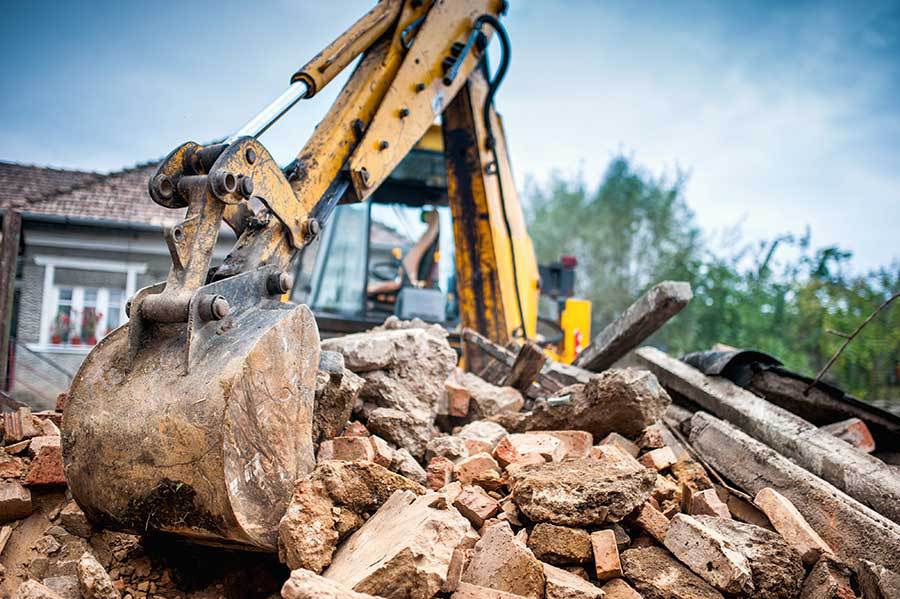
1. Get the right contractor
The first step in the commercial building demolition process is to find a licensed and insured contractor to assist you with your project. Your potential candidates can also meet at the site to discuss possible solutions with you.
2. Inspection
In most states, older commercial buildings have to be inspected prior to demolition to determine if there are any signs of:
- Lead paint
- Asbestos
- Rotten wood
- Mold
- Other hazardous materials
3. Get the relevant permits
You will typically need a permit before you can demolish your commercial building. In most cases, you can obtain the permit from your local authority offices or on their website if they provide for such measures. You may also have to adhere to rules related to notifications, noise, hours of demolition, or disposal of debris set by City Hall.
4. Disconnect any existing services
There are certain utilities and services that must be disconnected prior to demolition, some of which include sewerage, electricity, water, and gas.
5. Make the area safe for others
Other than shutting off the utilities, be sure to ensure that the adjacent walkways and buildings are protected. You can do this by putting up temporary fencing.
6. Make arrangements for salvage
In case you have salvageable materials in the commercial building, you should work with your contractor to recover reusable or recyclable materials. Depending on the situation, you can sell or donate such items.
7. Tear down the commercial building
This process can take several days depending on which deconstruction method you ultimately decide on. In most cases, it involves the use of a hydraulic excavator to tear down the commercial building and to put away debris into a dumpster or truck.
8. Clear all the debris
Once the demolition is over, make sure you clear all the debris to leave the site clean.
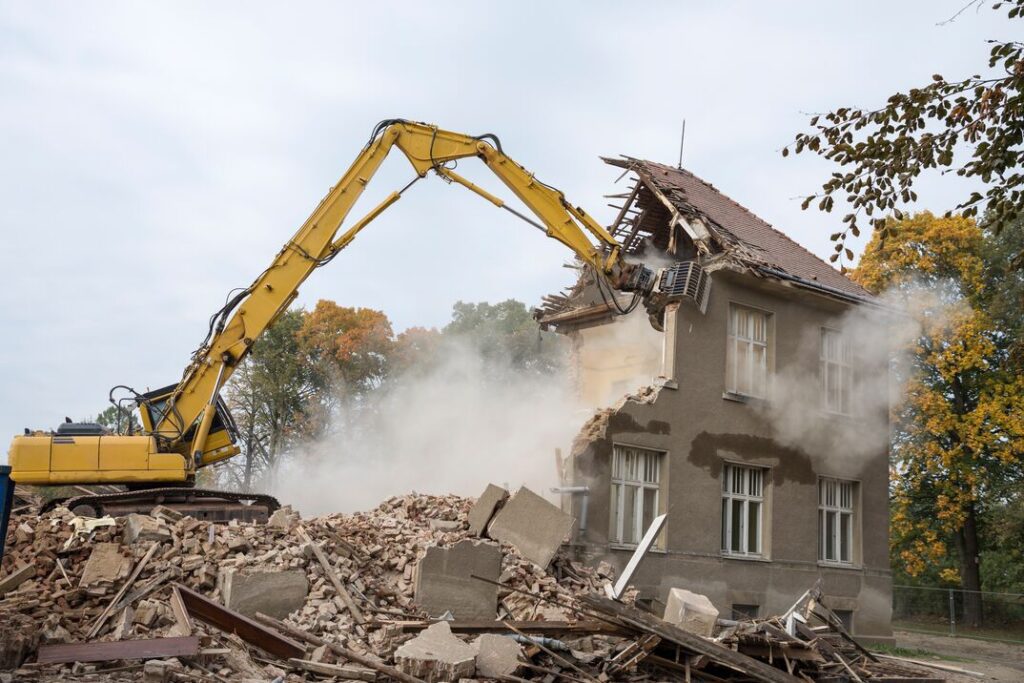
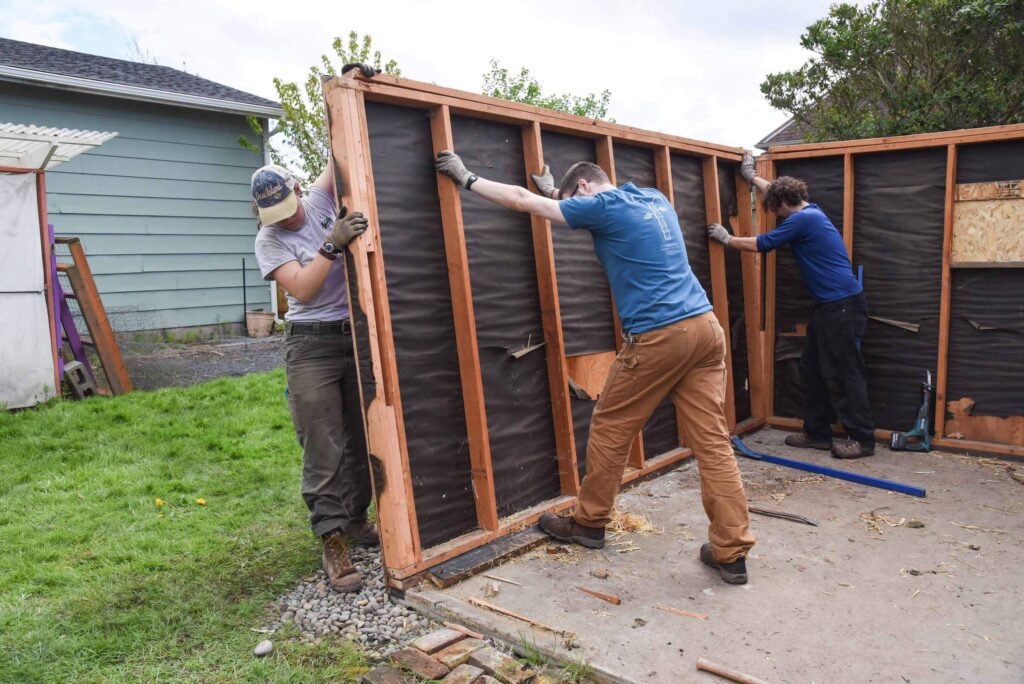
What You’ll Get
Avoid These 6 Red Flags When Hiring a Contractor
There are risks involved when hiring a contractor, so skipping some of the bases and crossing your fingers when hiring a contractor is not an ideal approach.
-
Unable to Verify References
While we would like to think that all contractors are good, honest, straightforward people, that just isn’t always the case. This is why it’s so important to do your research instead of simply hiring a contractor based on face value or his word alone. Don’t be afraid to ask a contractor for a list of references. If they give you an excuse or anything other than references from past projects—and a happy-to-do-it attitude—avoid moving forward with that contractor. Once you have a list of referrals, don’t stop there; reach out to several of them to ask them about their experience.
Don’t just ask general questions, get specific:
- What project did they do for you?
- What was your overall experience like?
- Did they abide by the terms and conditions of the contract?
- Was the project completed to your satisfaction and on time?
- Did they complete the project within the agreed budget?
- Were they easy to communicate with?
- Would you recommend them?
-
A Vague or Non-Existent Contract
One of the biggest and most detrimental mistakes a commercial building owner can make when hiring a contractor is failing to get everything—and we mean everything—hashed out and in writing. It can be easy to lose sight of all your questions (and follow-up questions) once you get on the phone or speak with the contractor in-person. So, make sure to have a running list of details you’ll need to nail down before being able to decide whether or not this is the right contractor for you and your project.
A contract is legally binding and once it’s signed, you’re stuck with it.
At the bare minimum, it should include:
Project Details & Guidelines
- An in-depth description of the project, including the scope of the work, the materials/equipment that will be used, who will be at the job site (working and/or supervising)
- Project start date and estimated date of completion (If your project is on the larger, more complicated side, outline various completion dates for each stage of the project. This will make sure the project stays on track.)
- A protocol for handling any changes that may arise, whether due to new work orders, unforeseen issues, or cancellations
Budget & Payment Schedule
- An estimate and the work/materials that the estimate includes
- A clear-set schedule for payment (Ideally, you will pay a small portion of the overall price upfront, and then you will pay for the work as it is completed.)
You should never sign a contract unless you can confidently say, ‘yes’ to the following questions:
- Did I thoroughly research this company and determine they are qualified to do this work to my expectations?
- Does this contractor clearly understand my vision, budget, and timeline for this project, and is this information explicitly outlined in the contract?
If a contractor hesitates to provide a written contract that meets your standards, avoid hiring that contractor, or at the very least, go back and forth with them until the contract is up to snuff.
-
A Too-Good-To-Be-True Price
We all love a good price. However, unlicensed and unqualified contractors may take advantage of unsuspecting commercial building owners under the guise of a great deal. A little research will reveal that this contractor has bad customer reviews, little to no experience doing the work, or they’re simply not qualified or licensed to do the work.
While a good price is important, it isn’t the end all be all when it comes to hiring a contractor.
Make sure you don’t lose sight of the big picture when shown a low price. The best contractor will offer a balance of skill, experience, and positive customer reviews with reasonable pricing.
-
Asking to pay the full price upfront or in cash
Avoid paying a contractor in cash. If a contractor asks you to pay for the entire project upfront, take a step back (or turn around and run). It’s completely normal to pay for a small percentage of the project before it begins (think 30-50%), but a contractor asking you to pay for any more than half of the project at the start is a cause for concern. By establishing a payment plan in which payments are made as the project is completed, you will avoid the risk of the contractor using your down payment to finance another project, or worse, skip out on the project altogether with your payment in tow.
Likewise, a contractor who insists on receiving all payments in cash could potentially be up to no good.
A reputable business will have no problem accepting multiple forms of payment. For the sake of proof of payment, we always recommend paying with a debit or credit card, check, or money order.
-
No insurance
The importance of insurance cannot be overstated. If your contractor doesn’t have adequate insurance, you could be the one left responsible should a worker be injured or something else goes wrong during the project.
Another way to protect yourself is to obtain a waiver of lien from your contractor and each subcontractor that will be working on your project to ensure that they cannot file a lien against your property.
This will protect you should the contractor fail to pay the subcontractors, who then decide to file a lien on your property, demanding more payment from you.
-
Not licensed
Along the same lines as insurance, a contractor should be properly licensed to perform the work in that state. These licensing laws are designed to protect property owners from negligent or dishonest contractors. Depending on your state’s licensing laws, it could be relatively simple to acquire a contractor’s license. That said, it still acts as a basic indication that your contractor may be qualified to do the work. Different licenses are required for different types of work, so make sure your contractor has the necessary licensing to assist in your project. Also, make sure you understand the difference between a contractor’s bond, license, and insurance.
100% Free Estimate
Do you need Residential or Commercial services completed?
What category of service do you need completed?
Residential
Commercial
Please click the “Request Estimate” button on the service page of the landscaping service you wish to hire Rybak Construction. Once the form is completed you will hear back from us within 2 hours. It takes less than 30 seconds to fill out the 100% Free Estimate form which includes:
- your address of the location you wish the service to be completed
- your phone number
- your email
Residential
Commercial
General Contractor

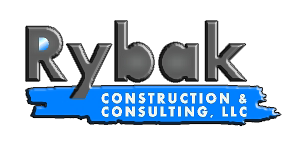
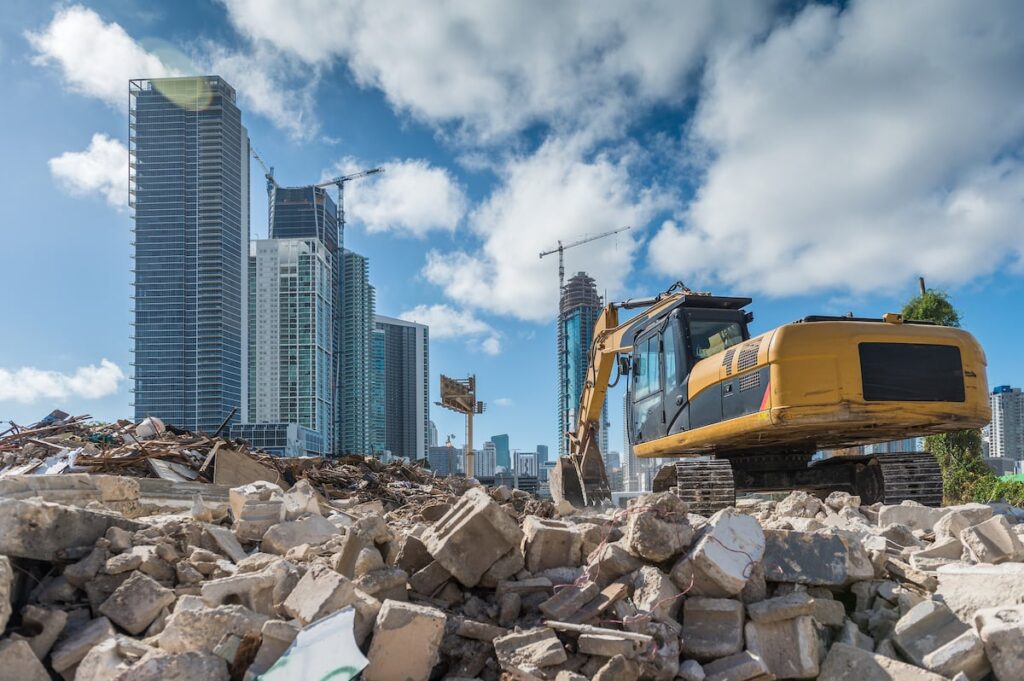
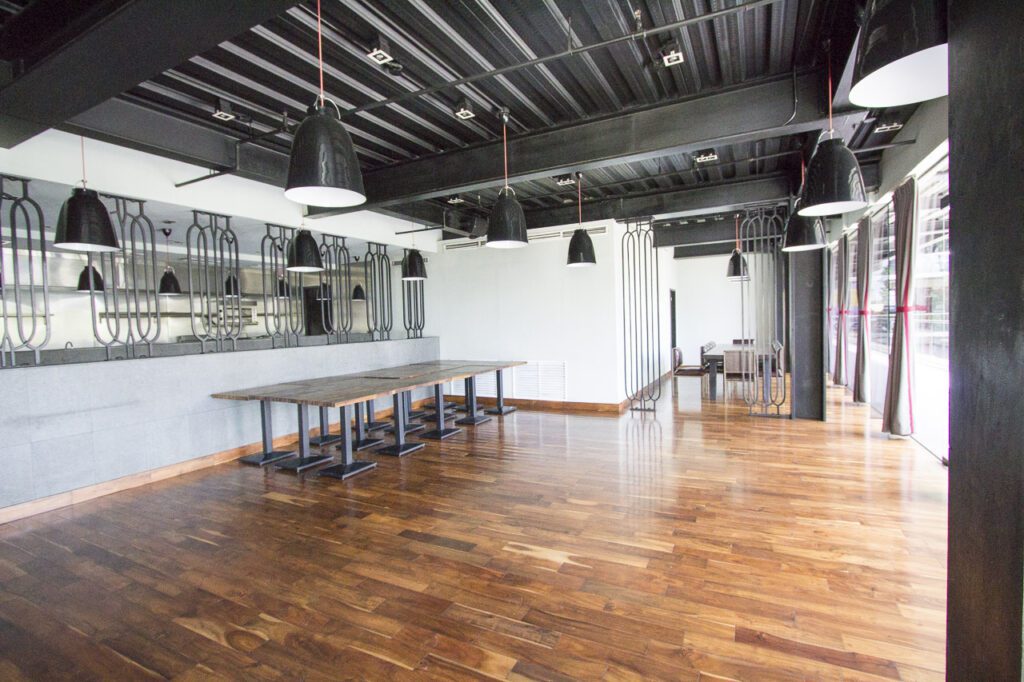

Reviews
There are no reviews yet.